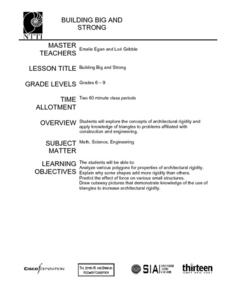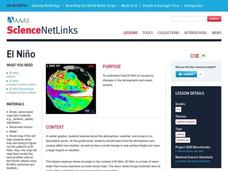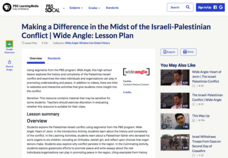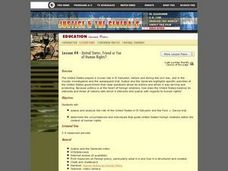Curated OER
Criminal or Hero
Young scholars investigate slavery in America circa the American Revolution. They will examine point- of view and perspective as they research a variety of informational resources. While this is designed to be used with the PBS video...
Curated OER
Building Big and Strong
Middle and high schoolers explore the concepts of architectural rigidity. They analyze a variety of polygons, and explain why some shapes add more strength to structures than others. The PBS video, "Building Big," is utilized in this plan.
Curated OER
El Nino
Explore the properties of water and the affects of El Nino. Middle schoolers will learn about the devastation an El Nino can cause as well as the definition of El Nino. Additionally, they will discover the cause of El Nino along with the...
PBS
The Diary of Anne Frank
While designed to supplement a viewing of the PBS Masterpiece Classic The Diary of Anne Frank, this resource can also serve as an excellent informational text and activity source for your learners on the historical context and timeline...
BW Walch
Unexpected Family History
The history of the northern states' involvement in the slave trade is not widely known. This resource uses the PBS documentary, Traces of the Trade, and the nonfiction book, Children of the New England Slave Trade, to examine this aspect...
Perkins School for the Blind
The Germinator
How does a plant grow from a seed? Observe the process with a clever idea from the PBS television show ZOOM. Watch the video, then have your young botanists create their own germinators. The lesson described here is for visually impaired...
PBS
Copyright and Fair Use
When is using someone else's copyrighted material appropriate? Learn about copyright and fair use with a instructional activity from PBS.org. Scholars read through a reference sheet about authors' rights and users' rights, and then...
PBS
Facts vs. Opinions vs. Informed Opinions and their Role in Journalism
Do reporters write about what they see, or what they think? Examine the differences between investigative writing and opinion writing with a activity from PBS. Learners look over different examples of each kind of reporting, and convince...
PBS
Hands-On Engineering Challenges to Bolster Your Electricity, Sound, and Force Units
Need some activities to go along with your unit? A collection of hands-on activities from PBS offers opportunities to add to your electricity, sound, and force units. The electricity activities revolve around building a...
PBS
Exoplanets through Kepler’s Laws
The majority of all confirmed exoplanets relied on Kepler's laws to discover their locations. Scholars learn how to apply Kepler's laws and then practice using data to discover exoplanets. They benefit from NASA video footage, NOVA...
PBS
Data Plots of Exoplanet Orbital Properties
Scientists discovered the first exoplanet in 1995 and by early 2018, they confirmed the existence of more than 3,700—that's a lot of data! As part of the PBS 9-12 Space series, scholars interpret data about exoplanets. They compare...
PBS
Experience a Solar Eclipse
Didn't catch the last solar eclipse? Now every day can be eclipse day, thanks to an interactive lesson from PBS' Space series for middle schoolers! The well-rounded multi-media experience includes video clips, an interactive, and...
PBS
Making a Difference in the Midst of the Israeli-Palestinian Conflict
What can individuals do to give peace a chance in the Middle East? Through a series of activities including viewing segments from a PBS video, class members learn about the complex history of the conflict and about efforts to promote...
PBS
Why Isn't There an Eclipse Every Month?
Searching for an eclipse activity that sends scholars over the moon? Try an interesting interactive to get their minds active! The resource, part of an extensive Space series from PBS Learning Media, uses modeling and data analysis to...
PBS
Rain Shadows
Satellite images from NASA help scholars focus on the similarities on the planet rather than the differences. The photos from the installment of a larger PBS series exploring weather and climate compare geological formations in the...
PBS
Mountain Weather: Orographic Lift
Why do so many mountain ranges exist next to a desert? As part of a larger series, PBS 6-8 Weather and Climate answers this question. The presentation offers diagrams and photographs of the development of a rain shadow. From Oregon to...
PBS
The Landscape of the Pacific Northwest
The Pacific Northwest includes four mountain ranges and one rain forest. Explore the breathtaking scenery using a lesson from a larger series from PBS covering climate and weather. Starting with photographs taken from the international...
PBS
Latinos at the Ballot Box
Latinx people have had a profound effect on voting patterns, going back to the 1950s. Using video clips from the PBS series "Latino Americans," scholars work to assemble a timeline of the interesting history. Then, pupils consider the...
PBS
Stories of Arrival
While every family's immigration story is unique, patterns emerge when looking at individual narratives. Using clips from the PBS video series, "Latino Americans," learners look at commonalities among immigrant experiences. A chart helps...
PBS
What's In a Name?
What is in a name? Eager historians trace the geographical history of places in the United States with Spanish names. Using a worksheet activity, clues, and web research developed in conjunction with the PBS "Latinos in America" series,...
PBS
Puerto Rican Perspectives
Puerto Ricans are wholly American, but their history with the United States has been one of tumult. Using clips from a PBS documentary, viewers consider the history of the island and Puerto Rico's contributions to the mainland United...
PBS
Satire, Parody, and Humor in Catch-22
Laughter is the heart of dark comedy. It makes the unbearable bearable. Joseph Heller crafted his dark comedy Catch-22 to enable readers to laugh at the painful realities and underscore the absurdities of a war where people you...
Curated OER
Horatio's Ratios
View a PBS video entitled Horatio's Drive and explore Horatio's Ratios. Collaborative learners form groups to use Mapquest to determine distances covered. They generate the mathematical averages, ratios, and rates in order to calculate...
Curated OER
Justice & The Generals: Education - Lesson Plan 4 - United States: Friend or Foe of Human Rights? | PBS
Students asses and analyze the role of the United States in El Salvador and the Ford v. Garcia trial. They determine the circumstances and individuals that guide United States foregin relations within the context of human rights.
Other popular searches
- Pbs Programs
- Mexican American War Pbs
- Advertising Techniques Pbs
- Napoleon Bonaparte Pbs
- Pbs and Jim Crow
- Consumer Awareness Pbs
- Pbs Building Big Skyscrapers
- Pbs American Field Guide
- Pbs Influenza Video 1918
- Rwanda Pbs
- Dna Fingerprint Pbs
- Emmett Till Pbs

























